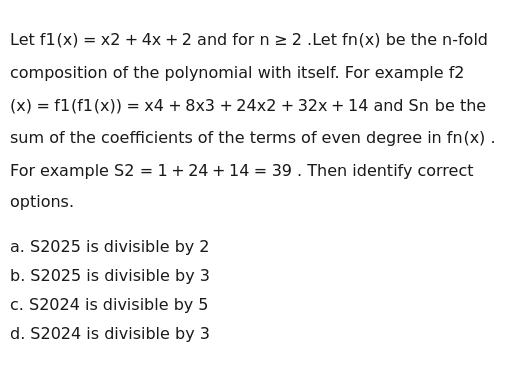Question
Question: Let $f_1(x) = x^2 + 4x + 2$ and for $n\ge 2$.Let $f_n(x)$ be the n-fold composition of the polynomia...
Let f1(x)=x2+4x+2 and for n≥2.Let fn(x) be the n-fold composition of the polynomial with itself. For example f2(x)=f1(f1(x))=x4+8x3+24x2+32x+14 and Sn be the sum of the coefficients of the terms of even degree in fn(x). For example S2=1+24+14=39. Then identify correct options.

S2025 is divisible by 2
S2025 is divisible by 3
S2024 is divisible by 5
S2024 is divisible by 3
S2025 is divisible by 3, S2024 is divisible by 3
Solution
Let f1(x)=x2+4x+2. Let fn(x)=f1(fn−1(x)) for n≥2. Let fn(x)=amxm+am−1xm−1+⋯+a1x+a0. Sn is the sum of the coefficients of the terms of even degree in fn(x). Sn=a0+a2+a4+….
We know that for any polynomial P(x), the sum of coefficients of even degree terms is 2P(1)+P(−1). Applying this to fn(x), we have Sn=2fn(1)+fn(−1).
Let an=fn(1) and bn=fn(−1). a1=f1(1)=12+4(1)+2=7. b1=f1(−1)=(−1)2+4(−1)+2=1−4+2=−1.
For n≥2, an=fn(1)=f1(fn−1(1))=f1(an−1)=an−12+4an−1+2. For n≥2, bn=fn(−1)=f1(fn−1(−1))=f1(bn−1)=bn−12+4bn−1+2.
Let's compute the first few terms of the sequence bn: b1=−1. b2=b12+4b1+2=(−1)2+4(−1)+2=1−4+2=−1. b3=b22+4b2+2=(−1)2+4(−1)+2=1−4+2=−1. By induction, if bk−1=−1, then bk=f1(−1)=−1. Since b1=−1, bn=−1 for all n≥1.
Now let's analyze the recurrence for an: an=an−12+4an−1+2. We can rewrite this as an+2=an−12+4an−1+4=(an−1+2)2. Let cn=an+2. c1=a1+2=7+2=9. cn=cn−12. c1=9=32. c2=c12=(32)2=34. c3=c22=(34)2=38. In general, cn=c12n−1=(32)2n−1=32⋅2n−1=32n. So, an+2=32n, which means an=32n−2.
Now we can express Sn using the formula Sn=2an+bn: Sn=2(32n−2)+(−1)=232n−3.
We need to check the divisibility of S2024 and S2025. S2024=2322024−3. S2025=2322025−3.
-
Divisibility of S2025 by 2:
S2025=2322025−3. For S2025 to be divisible by 2, the numerator 322025−3 must be divisible by 4. Since 22025 is even, 322025≡1(mod4). So, 322025−3≡1−3≡−2≡2(mod4). Since 322025−3≡2(mod4), it is of the form 4q+2. S2025=24q+2=2q+1. This is an odd number. An odd number is not divisible by 2.
-
Divisibility of S2025 by 3:
S2025=2322025−3=23(322025−1−1). The term 322025−1 is an integer power of 3, so it is an odd number. 322025−1−1 is an odd number minus 1, which is an even number. Let 322025−1−1=2m for some integer m. S2025=23(2m)=3m. This shows that S2025 is divisible by 3.
-
Divisibility of S2024 by 5:
S2024=2322024−3. For S2024 to be divisible by 5, 322024−3 must be divisible by 10. This means 322024−3≡0(mod10), or 322024≡3(mod10). The cycle length of powers of 3 modulo 10 is 4. Since 22024 is divisible by 4, 322024≡1(mod10). We need 322024≡3(mod10). 1≡3(mod10) is false. So, 322024−3 is not divisible by 10. S2024≡4(mod5), so S2024 is not divisible by 5.
-
Divisibility of S2024 by 3:
S2024=2322024−3=23(322024−1−1). The term 322024−1 is an integer power of 3, so it is an odd number. 322024−1−1 is an odd number minus 1, which is an even number. Let 322024−1−1=2k for some integer k. S2024=23(2k)=3k. This shows that S2024 is divisible by 3.
